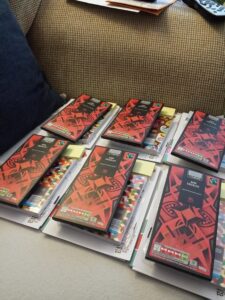In my writing and webinar work I try to help and to give perspective on the viva. I try not to share things like a great to do list, but also know that some people I engage will treat things that way:
If I do X then Y will happen and everything will be fine.
Everything probably will be fine. Things will probably work out the way you want and you’ll have the outcome you’re looking for – but the journey there might not be smooth, navigating the bumpy road of emotions, changes and endings along the way.
This has been hammered home to me in the last year as I’ve delivered webinars.
In a seminar room, people tend to have their public faces on. They could be unsure, they could be curious but they smile – there’s a mask in place. In a webinar, with cameras off and chat windows open, people talk more freely. Questions become longer than could be squeezed on a Post-it Note, and real emotions flow into the statements that people make:
I’ve not thought about how things are going to change… The pandemic hasn’t given me the chance or the pause until today…
I’m angry because of how my submission and viva will be so different than I had imagined!
I’m crying a little as no-one, not my supervisor or department, have told me that I’m good or talented before…
These aren’t direct quotes, but they are representative of what people have told me in just the last few months. Perhaps it’s been there in the background all along, and it took the shift to webinars for me to recognise it in candidates. Maybe it’s a more recent emergence brought on by the pressures of the last year.
In either case, if you want a to do list for getting ready, here’s my update: read your thesis, make notes, rehearse for the viva, boost your confidence…
…and make space to feel.
Reflect, not just on your talent to help build your confidence, but on where you are, how you got there and how you feel about all this. Happy, sad, angry, excited, scared – however you feel, make space for it. Unpick it a little maybe. See what you need to do.
